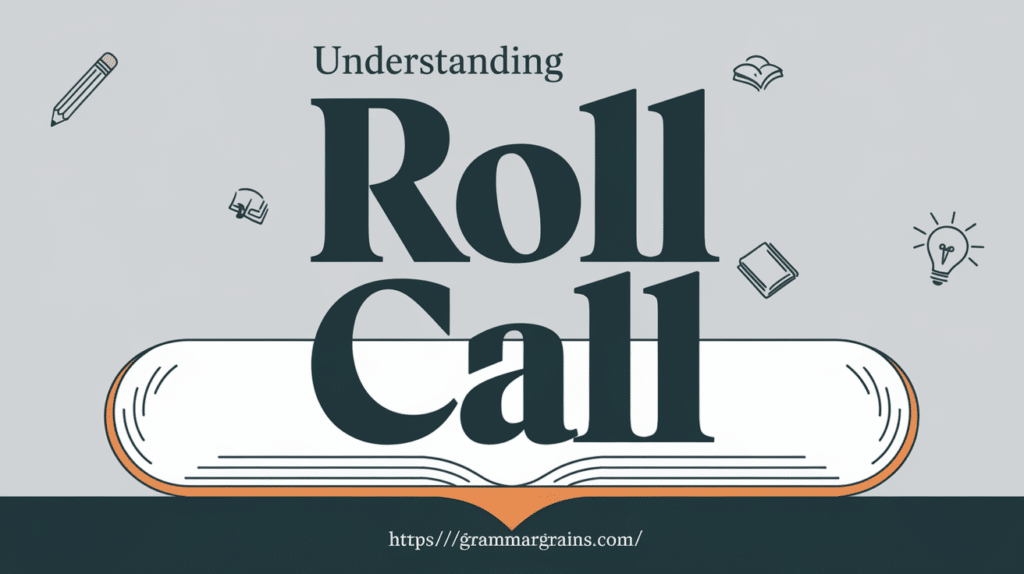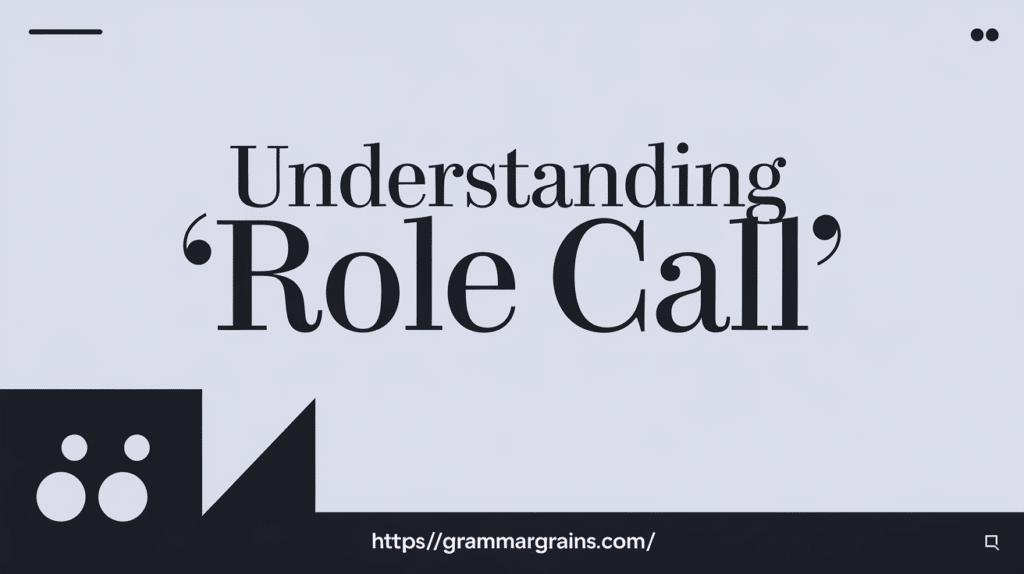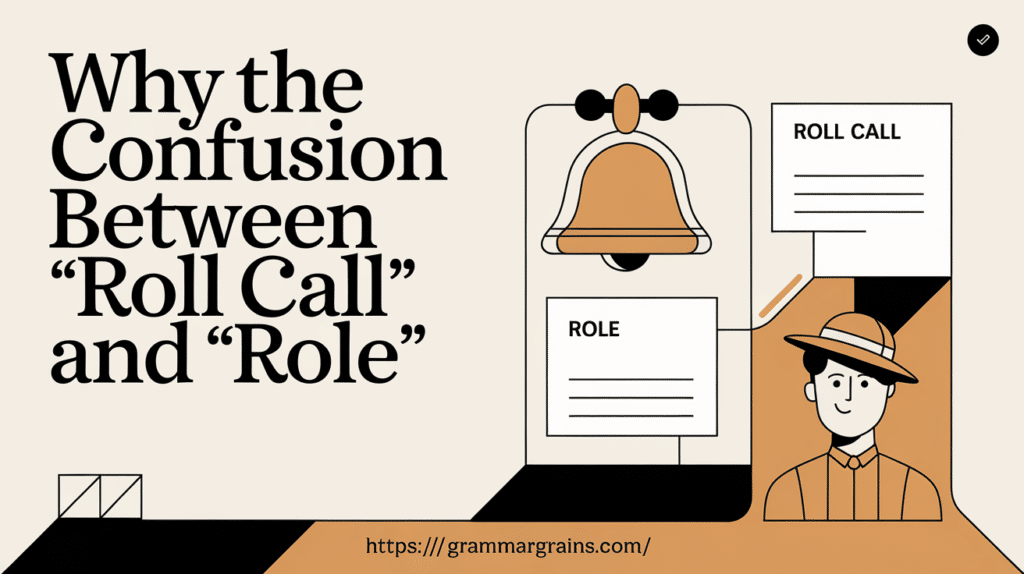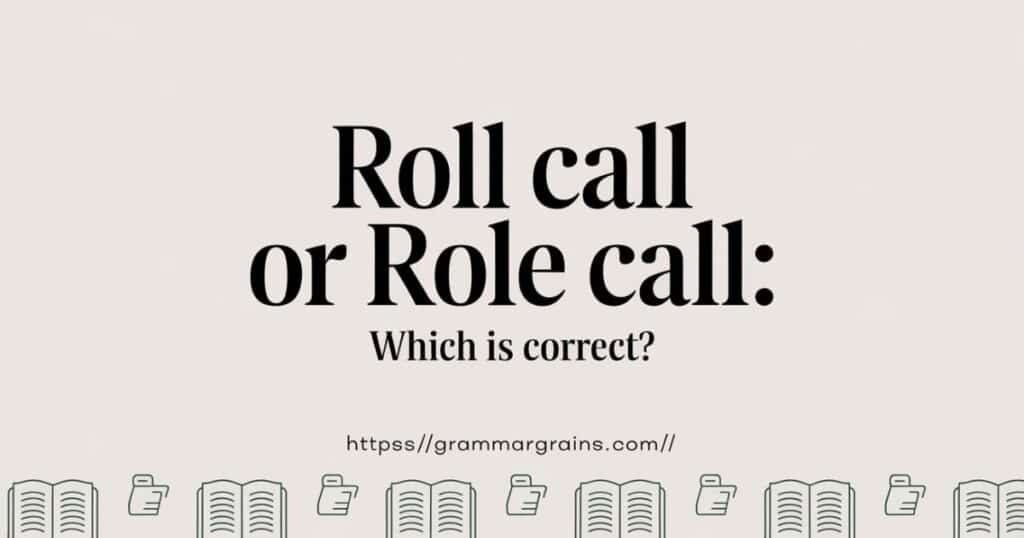If you’re unsure whether to write “roll call” or “role call,” you’re not the only one. English can be full of tricky words, and this is a common confusion.
So, which one is right?
The correct spelling is “roll call,” with two Ls.
Keep reading to find out why people often mix them up, the meaning behind each phrase, and how to use “roll call” correctly in various contexts.
Understanding “Roll Call”

The term “roll call” refers to the process of reading a list of names aloud to determine who is present.
This practice dates back centuries, originating from the use of paper scrolls—or “rolls”—that recorded names.
Over time, the phrase evolved to represent any systematic attendance-taking process.
In schools, roll call is a routine activity.
Teachers call out names to ensure students are present and accounted for, fostering a sense of structure in the classroom.
Beyond attendance, roll calls can serve safety purposes, such as during fire drills, where confirming every student’s presence is critical.
This routine also symbolizes the start of formal activities, setting a tone of responsibility and engagement for students.
The military has its own version of roll call, where it plays a pivotal role in maintaining discipline and readiness. Soldiers respond verbally or physically to signify their presence, ensuring accountability and order. Missing roll call can raise serious concerns, such as identifying potential emergencies or breaches of protocol. The military’s meticulous nature makes roll call a ritual of precision and respect.
In professional and governmental settings, roll calls are common in meetings, particularly when attendance affects the validity of decisions.
For instance, a legislative roll call confirms whether a quorum exists before votes can proceed.
This ensures transparency, fairness, and accountability, especially when critical decisions are at stake.
Even in today’s digital world, where online attendance tracking systems exist, traditional roll calls remain relevant as they reinforce the formality of proceedings.
Understanding “Role Call”

The term “role call” is not widely recognized as a standard phrase in English.
It often appears as a mistake, with people confusing it for “roll call.”
However, if interpreted literally, “role call” could describe a situation where roles, responsibilities, or functions are reviewed.
For example, a director might address an actor’s role in a play, or a manager might outline team members’ duties during a project meeting.
Despite its potential logic, the term “role call” rarely appears in formal English and is considered incorrect in most contexts.
Its misuse is largely driven by the similarity in pronunciation to “roll call.”
Some also assume “role call” makes sense because it involves people in specific roles responding. While this reasoning might seem intuitive, it doesn’t align with traditional language usage.
Adding to the confusion, social media and informal communication often propagate errors like “role call.”
On platforms like Twitter, it’s not uncommon to see phrases like “role call of influencers” or “role call of team leaders,” even when the context clearly suggests a list or attendance.
These mistakes, while understandable, can lead to misunderstandings, especially in formal settings.
To avoid such errors, it’s essential to stick with the established term: “roll call.”
Why the Confusion Between “Roll Call” and “Role Call”?

The primary reason behind this confusion is homophony—the phenomenon where two words sound the same but have different meanings.
Both “roll” and “role” are pronounced identically, making it easy to mix them up, especially in speech.
However, their origins and applications differ significantly.
The word “roll” comes from the Latin “rotulus,” meaning a scroll or list.
Historically, names were recorded on paper rolls, which were read aloud to check attendance. The phrase “roll call” emerged from this practice. On the other hand, “role” originates from the French “rôle,” referring to a character or part in a play. Over time, it expanded to encompass broader meanings, such as responsibilities or positions individuals occupy.
The digital age has also contributed to this confusion. Informal communication, especially on social media, often prioritizes phonetics over correctness.
A tweet or post might refer to a “role call” without realizing it’s a mistake.
This widespread misuse further blurs the line between the two terms, reinforcing incorrect assumptions among readers.
Another contributing factor is the logical connection between roles and individuals in a group.
For instance, in a workplace meeting, participants might associate their attendance with their roles, inadvertently leading them to use the term “role call.”
However, even in such contexts, “roll call” is the proper term, as it refers specifically to the act of verifying presence, not reviewing responsibilities.
How to Use Them Correctly

To avoid confusion, it’s crucial to understand the distinct contexts in which these terms apply:
- Roll Call: Use this term when referring to a list of names being read aloud to verify attendance. Whether it’s in a classroom, military drill, or corporate meeting, “roll call” is the correct choice.
- Example: The teacher conducted a roll call at the start of the day to ensure all students were present.
- Example: The sergeant’s roll call confirmed that all soldiers were accounted for after the exercise.
- Role Call: This term is rarely, if ever, correct. If you mean to review responsibilities or roles, use phrases like “review of roles” or “role assignment” instead.
- Incorrect: The manager held a role call to discuss the team’s responsibilities.
- Correct: The manager reviewed the team’s roles during the meeting.
By consistently using the correct term, you can enhance your communication skills and avoid common linguistic pitfalls.
Understanding the historical and practical distinctions between “roll call” and “role call” will ensure your language remains precise and professional.
Summary Table: Roll Call vs. Role Call

| Aspect | Roll Call | Role Call |
|---|---|---|
| Meaning | Checking a list of names for attendance. | Refers to a function or position. |
| Usage | Used for attendance verification. | Rarely used; often a mistake. |
| Spelling | Correct for classrooms, meetings, and drills. | Incorrect for attendance contexts. |
By keeping these distinctions in mind, you’ll never confuse these terms again.
Whether you’re attending a meeting, watching a play, or simply brushing up on your vocabulary, understanding the nuances of “roll call” and “role call” will help you communicate with clarity and confidence.
Conclusion
Understanding the difference between “roll call” and “role call” is essential for clear and accurate communication.
While “roll call” pertains to checking attendance or presence, “role call” is generally incorrect and should be avoided.
By using these terms correctly, you can ensure professionalism and avoid common linguistic errors.
FAQs
- What is the correct term: roll call or role call?
The correct term is “roll call” when referring to attendance or name-checking. - What does roll call mean?
Roll call is the act of reading a list of names to confirm presence. - Why do people confuse roll call and role call?
The confusion arises from their identical pronunciation despite different meanings. - Can role call mean reviewing responsibilities?
While logical, “role call” is rarely used. Instead, use phrases like “review of roles.”

Taila Lucy, an expert content writer at Grammar Grains, brings 4 years of experience crafting engaging pieces on grammar. Her work delves into synonyms, antonyms, slang, puns, and poetry, helping readers master English with creativity and flair.






